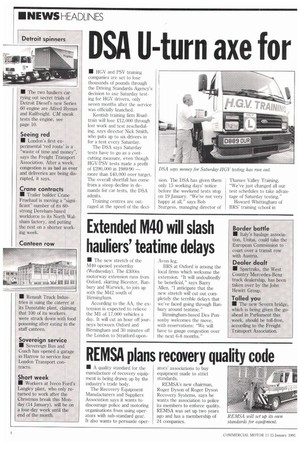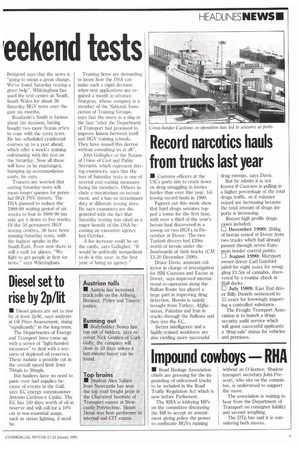DSA U-turn axe for eekend tests
Page 12

Page 13

If you've noticed an error in this article please click here to report it so we can fix it.
• HGV and PSV training companies are set to lose thousands of pounds through the Driving Standards Agency's decision to axe Saturday testing for HGV drivers, only seven months after the service was officially launched.
Kentish training firm Roadtrain will lose 212,000 through lost work and test rescheduling, says director Nick Smith, who puts up to six drivers in for a test every Saturday.
The DSA says Saturday tests have to go as a costcutting measure, even though HGV/PSV tests made a profit of 2290,000 in 1989/90 — more than 240,000 over target. The overall shortfall has come from a steep decline in demands for car tests, the DSA admits.
Training centres are outraged at the speed of the deci sion. The DSA has given them only 15 working days' notice before the weekend tests stop on 19 January. "We're not very happy at all," says Bob Sturgess, managing director of Thames Valley Training. "We've just changed all our test schedules to take advantage of Saturday testing."
Howard Whittingham of BRS' training school in Bridgend says that the news is "going to mean a great change. We've found Saturday testing a great help". Whittingham has used the test centre at Neath, South Wales for about 30 Saturday HGV tests over the past six months.
Roadtrain's Smith is furious about the decision, having bought two more Scania artics to cope with the extra tests. He has scheduled residential courses up to a year ahead, which offer a week's training culminating with the test on the Saturday. Now all these will have to be rearranged, bumping up accommodation costs, he says.
Trainers are worried that cutting Saturday tests will mean longer queues for potential HGV/PSV drivers. The [)SA planned to reduce the 1988-89 waiting period of six weeks to four in 1989-90 but only got it down to five weeks. Of the 58 permanent HGV testing centres. 36 have been running Saturday tests, with the highest uptake in the South-East. Even now there is still a rush for places. "We fight to get people in first for tests," says Whittingharn. Training firms are demanding to know how the DSA can make such a rapid decision when test applications are required a month in advance. Sturgess, whose company is a member of the National Association of Training Groups, says that the move is a slap in the face "after the Department of Transport had promised to improve liaison between itself and HGV training schools. They have issued this decree without consulting us at all".
John Gallagher of the National Union of Civil and Public Servants, which represent driving examiners, says that the loss of Saturday tests is one of several cost-cutting measures facing his members. Others include a moratorium on recruitment, and a ban on detachment duty at different testing sites. He says examiners are disgruntled with the fact that Saturday testing was cited as a major benefit of the DSA becoming an executive agency last October.
A fee increase could be on the cards, says Gallagher. "It would be politically inexpedient to do it this year, in the first year of being an agency."
















































































